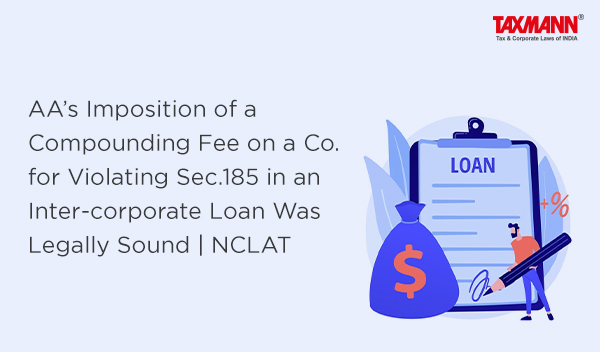AA’s Imposition of a Compounding Fee on a Co. for Violating Sec.185 in an Inter-corporate Loan Was Legally Sound | NCLAT
- Blog|News|Company Law|
- 2 Min Read
- By Taxmann
- |
- Last Updated on 22 November, 2023

Case Details: Som Prakash Satsangi v. Registrar of Companies - [2023] 156 taxmann.com 112 (NCLAT-Chennai)
Judiciary and Counsel Details
-
- M. Venugopal, Judicial Member & Shreesha Merla, Technical Member
- Ms Varuna Bhanrale, Adv. for the Appellant.
- Avinash Krishnan Ravi, Adv. for the Respondent.
Facts of the Case
In the instant case, an inter-corporate loan was advanced by the company ‘H’ to its fellow subsidiary company and ‘K’ was a common director on the board of both companies.
Non-compliance of the ingredients of section 185 took place on the part of ‘H’ and its directors, as ‘K’ was the common and interested director in the said fellow subsidiary company.
The company ‘H’ filed a suo-motu petition praying to compound the offence committed by violating section 185 and an impugned order was passed by the NCLT imposing compounding fees on ‘H’ and on the appellant – managing director of ‘H’, also, prosecuting ‘K’ for not applying for compounding of offence.
The appellant preferred the instant appeal praying for setting aside the impugned order to the extent it imposed fees on the appellant.
Appellate Tribunal Held
The Appellate Tribunal found that the appellant was not aggrieved in respect of the impugned order to extent that it directed prosecution against ‘K’. Since ‘H’ was liable for non-compliance of section 185 and violation of section 185 would make erring company liable with fine, the impugned order was free from any legal infirmity to the extent of imposing a compounding fee on ‘H’, its directors including the appellant and prosecution against ‘K’ and, thus, instant appeal was to be dismissed.
List of Cases Reviewed
-
- Order passed by the NCLT (Bengaluru) in [CP No. 615/BB/2018, dated 20-12-2018] (para 50) affirmed.
List of Cases Referred to
-
- Central Board of Trustees v. Indore Composite (P.) Ltd. 8 SCC 443 (para 17)
- Maulavi Hussein Haji Abraham Umari v. State of Gujarat AIR 2004 SC 3946 (para 18)
- Tolaram Relumal v. State of Bombay AIR 1954 SC 496 (para 19)
- Thirumalai Chemicals Ltd. v. Union of India [2011] 11 taxmann.com 204/108 SCL 78 (SC) (para 23)
- State of Punjab v. Bhajan Kaur [2008] 12 SCC 112 (para 24)
- Maneka Gandhi v. Union of India [1978] 1 SCC 248 (para 25)
- State of Uttarakhand v. Mayan Pal Singh Verma 2022 SCC Online SC 469 (para 27).
Disclaimer: The content/information published on the website is only for general information of the user and shall not be construed as legal advice. While the Taxmann has exercised reasonable efforts to ensure the veracity of information/content published, Taxmann shall be under no liability in any manner whatsoever for incorrect information, if any.

Taxmann Publications has a dedicated in-house Research & Editorial Team. This team consists of a team of Chartered Accountants, Company Secretaries, and Lawyers. This team works under the guidance and supervision of editor-in-chief Mr Rakesh Bhargava.
The Research and Editorial Team is responsible for developing reliable and accurate content for the readers. The team follows the six-sigma approach to achieve the benchmark of zero error in its publications and research platforms. The team ensures that the following publication guidelines are thoroughly followed while developing the content:
- The statutory material is obtained only from the authorized and reliable sources
- All the latest developments in the judicial and legislative fields are covered
- Prepare the analytical write-ups on current, controversial, and important issues to help the readers to understand the concept and its implications
- Every content published by Taxmann is complete, accurate and lucid
- All evidence-based statements are supported with proper reference to Section, Circular No., Notification No. or citations
- The golden rules of grammar, style and consistency are thoroughly followed
- Font and size that’s easy to read and remain consistent across all imprint and digital publications are applied



 CA | CS | CMA
CA | CS | CMA
